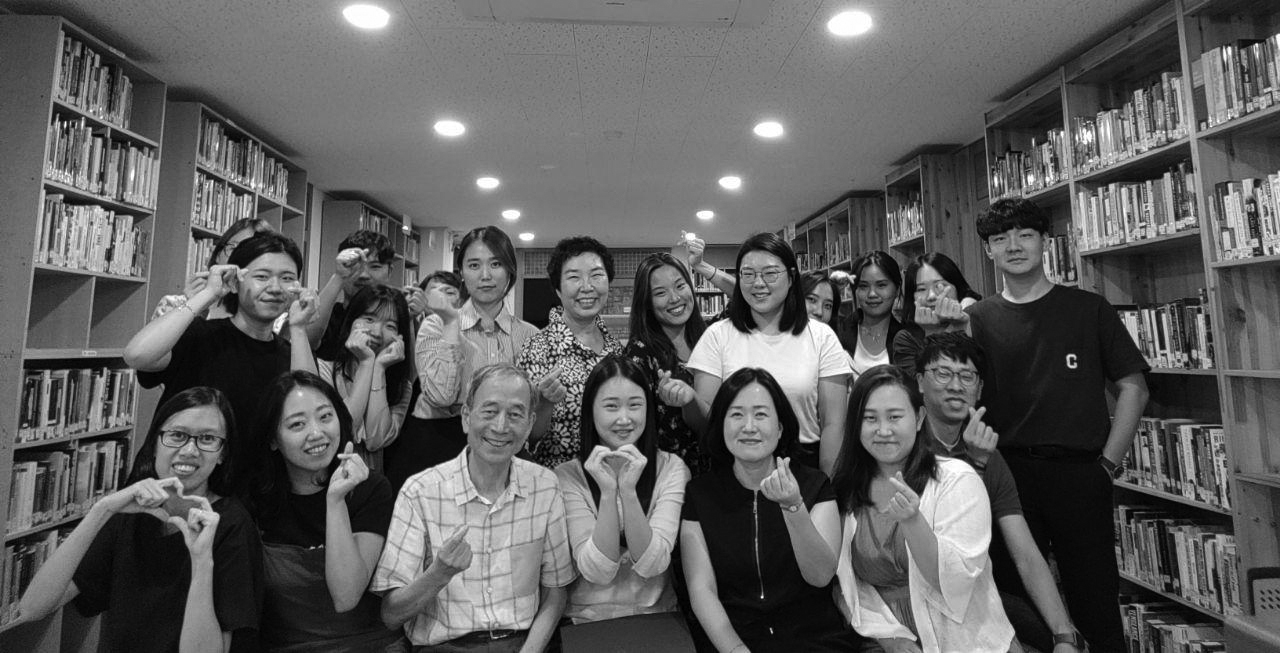Gwangju International Center Turns 20
Compiled by David Shaffer.
Mention “the GIC” to any foreigner in Gwangju, and they will most likely know instantly what you are referring to. For most, it has been here longer than they have, and it has played an important part in the lives of many. It is not an overstatement to say that it has played a very significant role in the Gwangju community. And this year, the Gwangju International Center turns 20. It celebrates this anniversary on December 7 at the GIC. This article marks the occasion with an extensive interview with the person who knows more about the GIC than anyone else, its director, Dr. Shin Gyonggu, and it is augmented with additional thoughts and impressions gleaned from the GIC’s present staff. First, the interview.
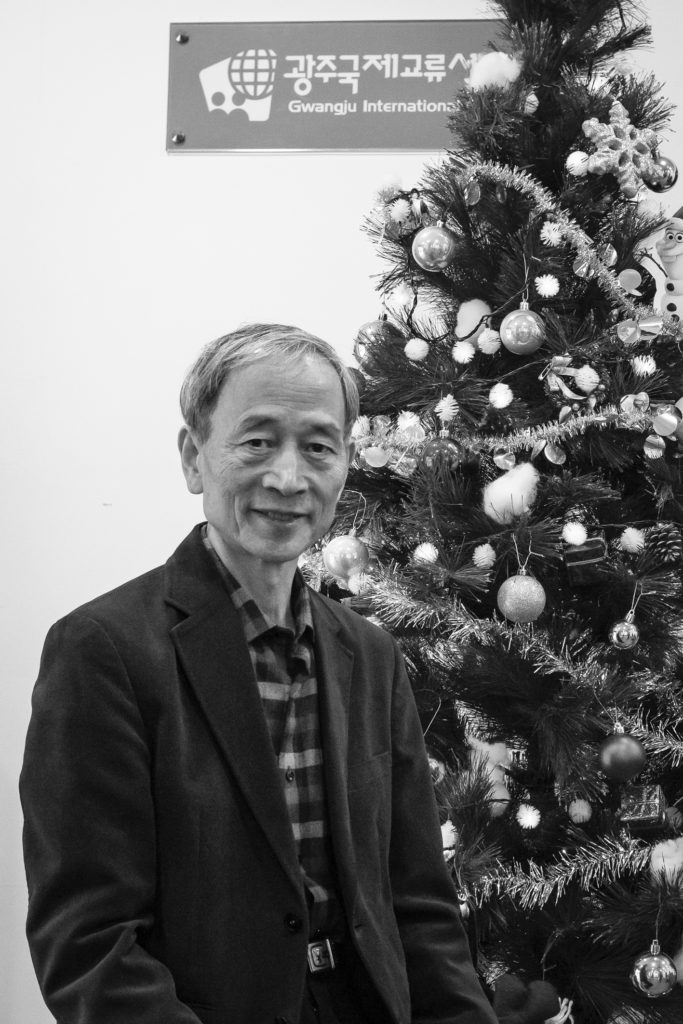
Interview with Dr. Shin Gyonggu
Gwangju News (GN): Thank you, Dr. Shin, for finding the time for this interview on the occasion of the 20th anniversary of the GIC, the Gwangju International Center. Since you have been with the GIC since its beginnings, would you tell us just how the idea of a GIC was conceived?
Dr. Shin Gyonggu: Frankly, the GIC was not my idea or initiation. I still do not know for certain who really conceived the idea or how it began. I was simply invited to the board at the end of 1998. There are quite a few who claim that it was their idea. I am sure that they got involved at the beginning of the project in one way or another, but now I am almost sure that the concept came from San Antonio, Texas. One of the junior officials at Gwangju City Hall visited San Antonio’s city government, and he brought that idea to Gwangju with him – that city official was Kim Byung-kyu. The original name of the GIC was KCIV (Kwangju Center for International Visitors). The then deputy mayor, Song Jaegu, brought that idea to Kwangju Citizens’ Solidarity (KCS) with financial support of 30 million won. KCS was one of the most prominent activist organizations in the late 1990s (but disappeared in the early 2000s).
I was recommended to chair the board of 15 directors, but I declined since I had no experience in civilian organizations. Prof. Lee Jongsu of Gwangju University accepted, and I then also declined the executive director position when asked. Suh Eugene, a longtime social activist in the US, accepted the position, but he was not approved by City Hall due to his lack of Korean citizenship. At that time, the system was not open as it is now. All things considered, I was obliged to accept the directorship.
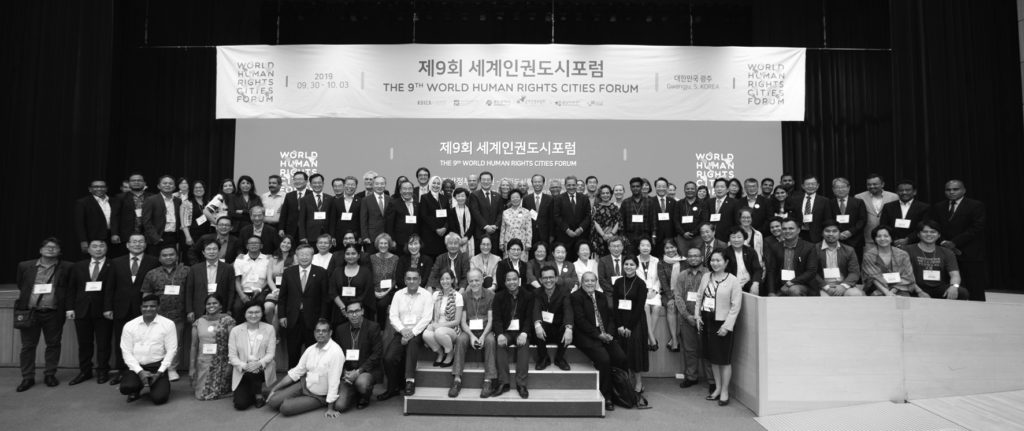
GN: Not all the international centers in the major cities around Korea are the same. Can you tell us how the GIC differs?
Dr. Shin: Sure. There are numerous differences between the GIC and other international centers. The GIC has the distinction of being the first international center in Korea, which officially opened in 1999. Now there are nine international centers nationwide with slightly differing names. All others are fully funded by their local governments, while we are independent and supported by fee-paying members of more than 1,000 Koreans and international residents, and by volunteers. I myself have been a fee-paying member and a volunteer for the last 20 years. Another significant difference is that we are providing services to both Korean and international residents in collaboration with volunteers and 20 full-time staff. Many international residents of Gwangju are not merely beneficiaries of GIC services but are service providers themselves. The best example of this international involvement is the Gwangju News, which would not have been possible without the international volunteers who comprise the majority of the staff and contributors. Many other GIC projects would also not be possible without both Korean and international volunteers. I am proud of the many independent projects managed mostly by volunteers, such as the GIC Talk, Gwangju Performance Project, Gwangju Free Cycle, GIC Citizens’ Choir, and the language exchanges for English, Chinese, and Spanish. The GIC is truly a platform where our international residents become mainstream members of Gwangju. Some projects are initiated and become active through volunteers, and some of them become inactive or even disappear when the leaders of the projects leave Gwangju. I would welcome even more projects being created by volunteer members.
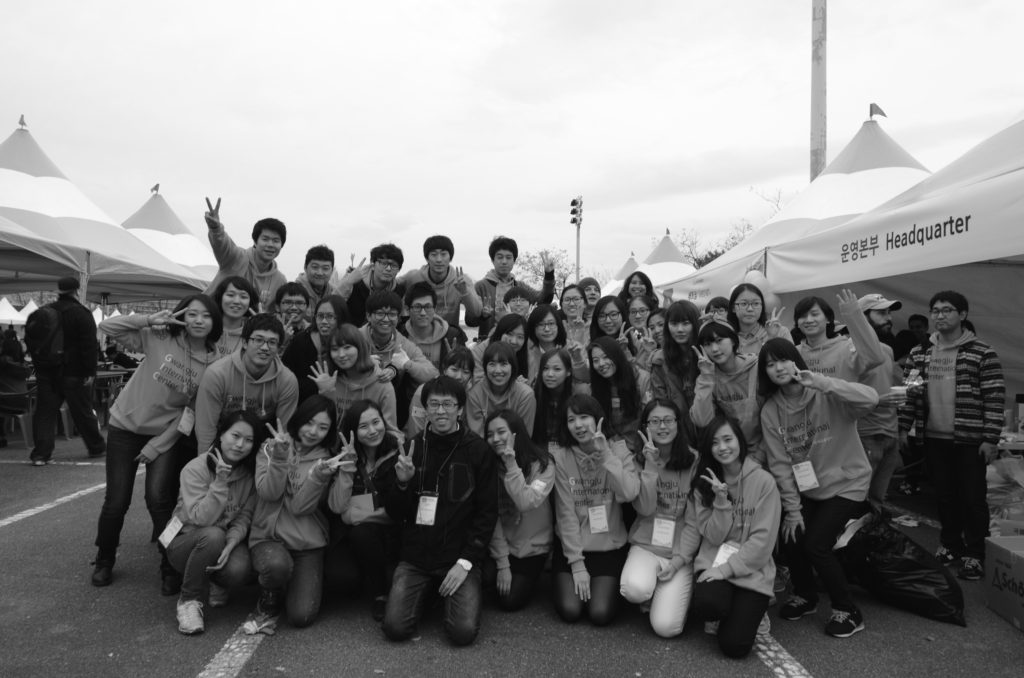
GN: What do you consider to be the highlights or the most notable of the many programs and projects over the years, as well as at present, that the GIC has been involved in?
Dr. Shin: I don’t have regrets about any of the programs that I just mentioned. However, in terms of impact, the Gwangju News, which we started in 2001, deserves to be considered the most important GIC project. We started it to promote Gwangju as an international city. I thought that an English monthly would be a great international asset to the city, so I did not mind when we suffered large annual deficits for printing up until 2010, when it began to be supported by City Hall. It also provides good publicity for the GIC itself. The GIC Talk has been a great asset by inviting both Korean and international speakers to the GIC. It has lured people to fill the GIC spaces with visitors on weekends. I love choir music, and I was extremely happy when we began to sing in the GIC Citizens’ Choir every Saturday morning since last year. I hope that more international members join the choir. [Dr. Shin is himself a member of the choir. — GN]
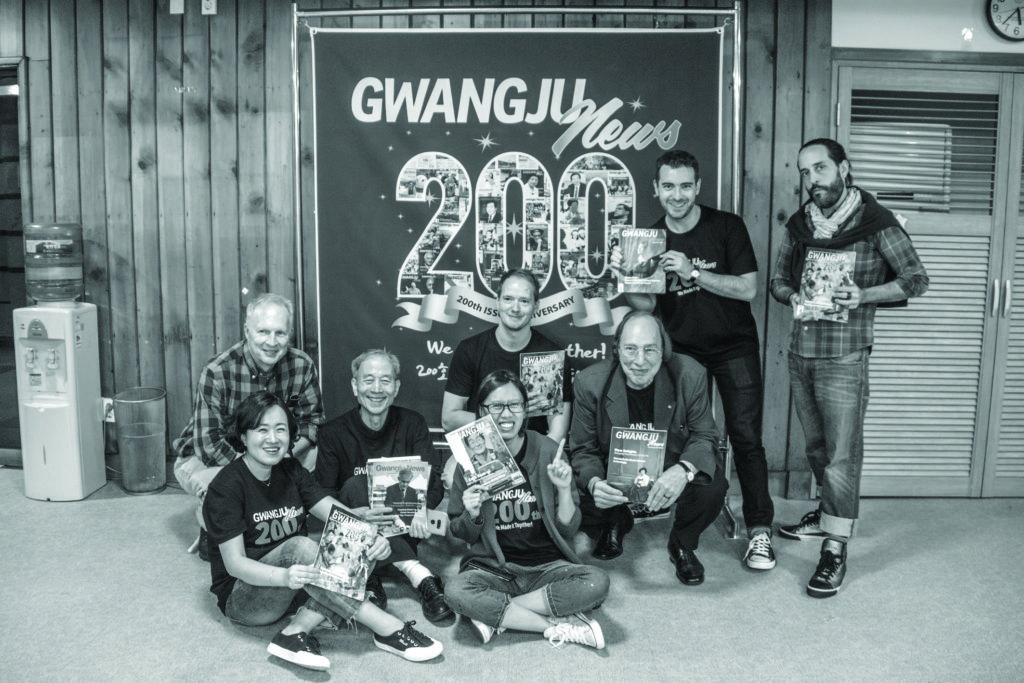
The biggest project of the GIC is now the World Human Rights Cities Forum (WHRCF), which Gwangju City Hall created in 2011. City Hall was not able to find a suitable organizer of the forum in 2014, so they came to the GIC as the last resort. We accepted the project in the hope that we could develop it into the most important annual international event of the city. Since then, it has grown about ten fold in number of sessions and participants. Participants in 2013 numbered about 250; we had around 2,000 this year, with 250 of them being international participants. Fewer than half of the international participants were supported by the WHRCF. Many sessions are now being organized by national and international organizations rather than solely by Gwangju. One of the most important aspects of the forum it that the event has grown so remarkably in the last six years – and with a budget increase of only 18 percent. Another, more important aspect is that the forum is successfully branding the City of Gwangju as a human rights city while promoting the concept of human rights and city rights around the world.
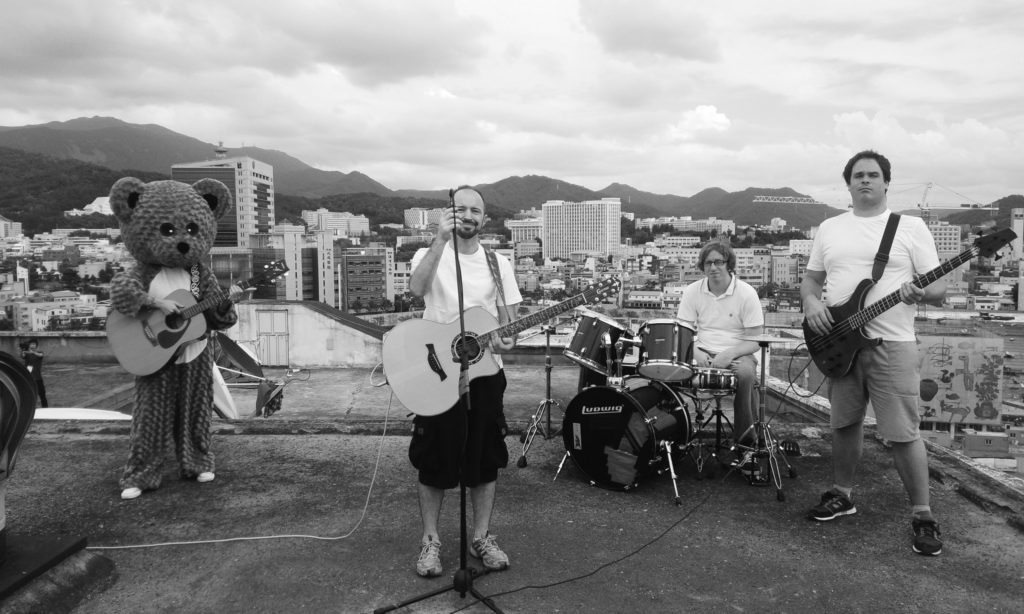
GN: In what ways do you think the GIC has contributed most to the international community in the Gwangju area?
Dr. Shin: About ten years ago, the Korean government began to increase support for international residents, focusing mainly on migrants married to Koreans. Though intentions were good, it resulted in these families being distanced in some aspects from the Korean community. The GIC is providing spaces for both local and international residents to carry out activities together or separately as they choose. I am very happy to find that the English teachers group created by the Filipino community now includes both local and international members. I would like to see if the GIC can be more effective in assisting our international community in becoming more of an integral part of mainstream Gwangju with more international community initiatives. The GIC also hopes to have more members of the international community as GIC members, volunteers, and staff coordinators. In the long run, I hope that the citizens of Gwangju are so open-minded and global-minded that the city’s international residents can obtain routine services anywhere in town and that there will be no need for them to have to search out the GIC for these services.
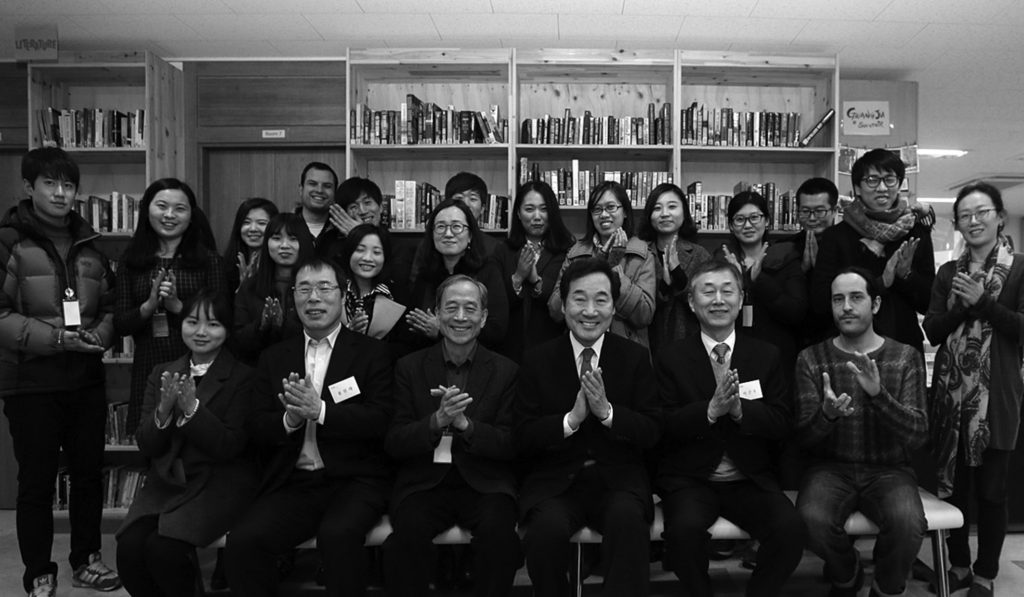
GN: You mentioned the GIC Talk. The GIC attracts dignitaries from around the world. Would you share with us some of the most memorable ones?
Dr. Shin: We have been privileged to invite many diplomats, high-ranking government officials, scholars, and journalists to be speakers at our GIC Talk events and to be featured in the Gwangju News. The first GIC Talk speaker was the Norwegian ambassador in 2006. The first ambassador to stay at my house was Chilean Ambassador Adolfo Carafi. His talk on the Chilean people’s struggle for democracy impressed an audience of around 100. He also paid tribute to the heroes buried at the May 18 Cemetery. Then in 2007, Indian Ambassador Parthasarathi gave a powerful presentation at the GIC Talk without the aid of a PowerPoint file or even a note in hand.
The 2009 GIC Talk by German Ambassador Seidt on German unification attracted a large audience to which he gave relevant advice on North–South Korea rapprochement. In 2010, it was enlightening to see the husband of the representative of UNHCR Korea helping his wife as if he were her assistant. I have stayed in touch with Vietnamese Ambassador Tran Trong Toan ever since he gave his GIC Talk in 2012.
In 2015, pop musician-turned-diplomat, Ambassador Lars Danielsson of Sweden made the GIC Talk audience envious of the cooperative relationship between his country’s employers and workers. Journalist Tim Shorrock and Prof. George N. Katsiaficas seem to have been the two most ardent advocates of the May 18 Democratization Movement and friends of Gwangju among those whom I have met at the GIC.
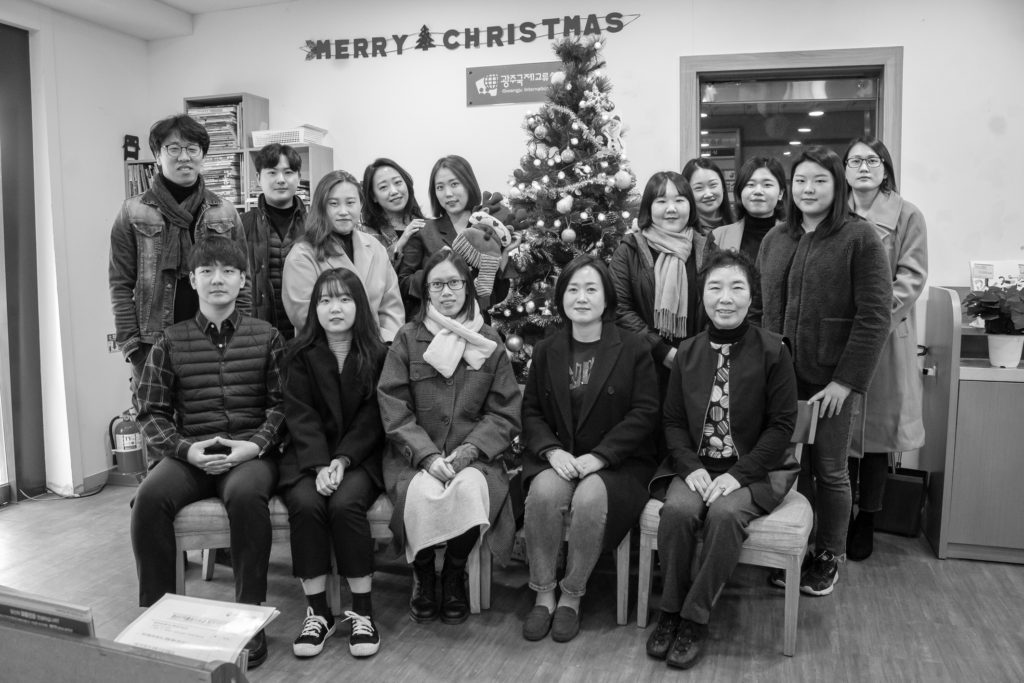
GN: That is an impressive group of visitors. What about the GIC staff? Some look young; others not so young. Some are Korean; others not so Korean.
Dr. Shin: Yes, there were four early GIC staff members that I must mention: Kim Namsuk (1999–2000), who now lives in New Zealand; Kim Soo-a (2000–2003), who is now the head of the Human Rights Office of the Korean Ministry of Justice; Park Geun and Kim Singsing (2002–present) and Kim Minsu (2005–present). The GIC would not now exist without them and their dedication.
I am also proud of our other talented coordinators who have joined more recently: Kim Taehyung, who has been leading the WHRCF team so successfully since 2014; and Lee Boram, Lim Eunjeong, and Lee Jeongmin, who are managing difficult projects of the International Support Team. I was eager to have an international resident as a coordinator, so I was very happy when an Indonesian lady began to work with us as a volunteer and then finally became a full-timer; that lady is Karina Prananto. Joey Nunez was the first American who worked at the GIC. He was with us for two years, even though his salary was very low at the time. He loved his work at the GIC, and so did we.
I am thrilled beyond description when our young coordinators meet a partner, get married, and begin to have children. I encourage them to bring their children to the GIC as early as possible. I like the noise the children produce in the office. It is also great to see the young staff grow and mature in diverse ways. So many of them are doing great at their jobs – much beyond expectations.
GN: What is it about the GIC that keeps you here? Is it the staff that you have to work with? I know that you have worked with no salary for the two decades that you have been at the GIC. So it isn’t that.
Dr. Shin: In the early years, I probably thought about quitting hundreds of times and for many reasons. There was so much work to do, and on top of that, I was still teaching full-time at Chonnam National University. There was the financial burden, job stress, and a variety of conflicts to deal with. But I feared that if I would have quit, the GIC would have disappeared. I did not want to disappoint the young coordinators and our GIC members who put their trust in me. In addition, I was aware of the value of the services that the GIC was providing for the community. In the beginning, there were more challenges than joys. As the GIC grew, I began to have more joys than challenges.
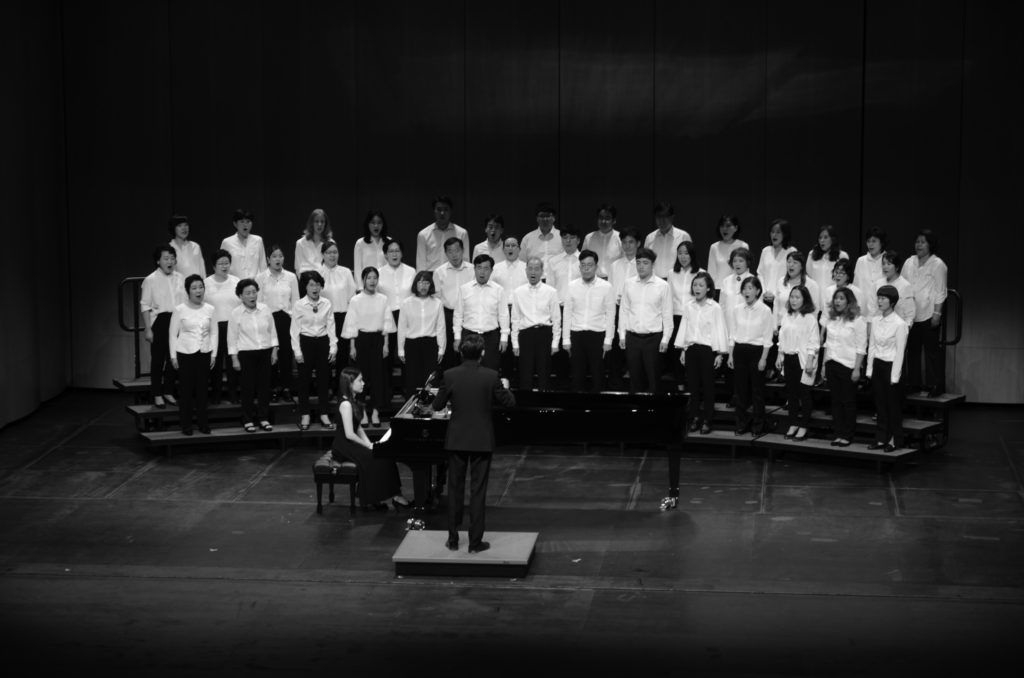
GN: So far, my questions have been about what the Gwangju News thinks our readers would like to hear about the GIC. What would you like for our readers to know about the GIC?
Dr. Shin: First and foremost, I would like the GIC members and the community to make the most of the GIC space and its resources. In this regard, the Gwangju Performance Project (GPP) is the best model. In the past, I often heard my staff complaining: “Why are we busy doing what other people or organizations ask us to do instead of having our own projects?” My response was: “We do not need to exist for our own needs. We exist for the needs of the community.”
I have talked mostly about the positive side of the GIC. However, there are clear limitations in our capacity, especially in mobilizing the community to actively participate in GIC projects and exercising ownership. In this regard, I point to the Gwangju News as the best model of member participation. I also like the GIC Citizens’ Choir and the GPP since they are fully managed by the participants.
GN: Thank you for the Gwangju News compliment. Going forward, what plans do you see in the cards for the GIC, and what do you see in the stars as the future of the GIC?
Dr. Shin: This is a perennial question that I have been asked over the past ten years, even by my own staff. I did not have any plan for the GIC in the beginning when I was coaxed into being the director. But things have changed since then. It may sound rather pompous, but I would like to continue to be a facilitator for the GIC staff and our members, as well as for the people working with us. Of course, there are many small and wild dreams that I would like to realize if circumstances permit: more engaging educational activities for young children together with their parents, international youth exchange courses similar to the International Summer Session I created at Chonnam National University, human rights tours with focus on but not limited to Gwangju, developing the World Human Rights Cities Forum into a world-class event, while providing more enjoyable and self-enriching job opportunities for young people in Gwangju. I would also like for the GIC to be more than just a democratic organization where people respect each other. I would like to see it grow in its efforts to help the community in helping themselves.
GN: Thank you, Dr. Shin, for your time, for the wealth of information, and for your insight. We hope that in the next 20 years, the GIC will be a force in contributing to the international and Korean community just as much as it has in the past two decades.
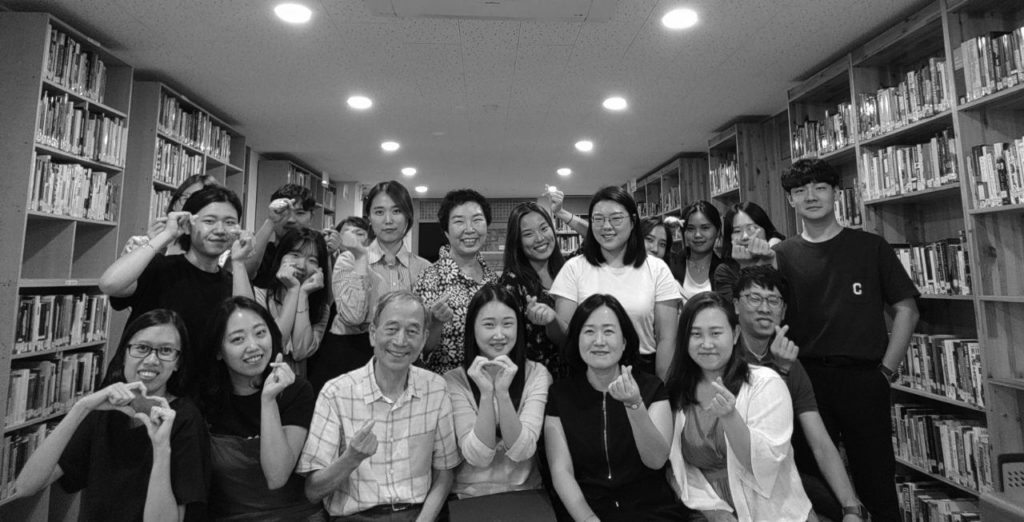
Reflections: The GIC Staff
While Dr. Shin is a reservoir of information on the GIC, I was also interested in getting the thoughts of some of the 20-member staff that he speaks so highly of. Catching up with them is not the easiest thing to do, as their work on various projects often takes them out of the office and keeps them busy when they are at their desks.
One thing that stands out for me is that so many of the staff started out as GIC volunteers. Park Minyoung discovered the GIC in 2013 and soon became a volunteer translator. Now she is a coordinator on the International Support Team (IST). Similarly, Lee Boram started out in 2010 as a volunteer and is now an IST coordinator. And Kim Minsu, who started out as a volunteer in 2003, is now the general manager of the GIC. This volunteer spirit is poignantly evident throughout the GIC staff. Karina Prananto relates that she views the Korean staff as selfless individuals “who work not for money but for service to the community.” Prananto is herself an IST coordinator who dedicates much of her time to Gwangju News activities.
Lee speaks of how the GIC has grown “from only a handful of international residents two decades ago to a drastically increased community of about 35,000, who now have their own voice in Gwangju society. Kim iterates how the GIC is the leader in fostering the paradigm of local residents and the foreign community working together in international exchange activities rather than merely offering government hand-out services to foreigners. She feels a sense of gratification when foreigners decide to extend their stay in Gwangju because of the GIC.
While Dr. Shin has words of praise for his GIC staff, they equivocally speak highly of him. Park recalls how it was Dr. Shin’s firm handshake and eyes gleaming with enthusiasm that convinced her to accept his job offer on the spot. That handshake, she recounts, “completely changed her life.” Prananto describes Dr. Shin as a “volunteer director” who is “selfless” in promoting Gwangju, his second hometown. Lee describes him as always being busy, donating his time, efforts, and even funds to the GIC. “Without his contributions,” Lee suggests, “the GIC could not exist.”
Lim Eunjeong is another IST coordinator at the GIC. She first met Dr. Shin at Chonnam National University where he was a professor and dean, and she was a part-time office assistant. This segued into three years of work at the GIC, which she then left to “experience different fields of work” and “travel the world.” After a four-year hiatus, she returned because of Dr. Shin, the selfless staff, and what the GIC stands for.
Through its first twenty years, the GIC has grown from a single desk in KCS office space to three floors of a downtown office building. This growth is due in no small part to the dedication of its long-time director and staff. In part, it is due to the GIC’s paradigm for success: local resident and the international community collaboration on projects of mutual concern. And in part, the success of the GIC can be attributed to the support it receives from the Gwangju community.
As it has for Park Minyoung, the GIC has changed my life, and it has had a positive effect on the lives of many more over the first 20 years of its existence. With its concept of service and the collaborative support of the local and international community of the city, there is no reason to believe that the contributions of the Gwangju International Center over the next two decades will not be able to exceed the extraordinary achievements of its first twenty years. Happy 20th, GIC.
The Author
David Shaffer is presently the board chair of the Gwangju International Center and editor-in-chief of the Gwangju News. He was for many years a professor of English at Chosun University and has known Dr. Shin Gyonggu for more years than he wishes to reveal. Both he and Dr. Shin invite our readers to the GIC anniversary event on December 7.





